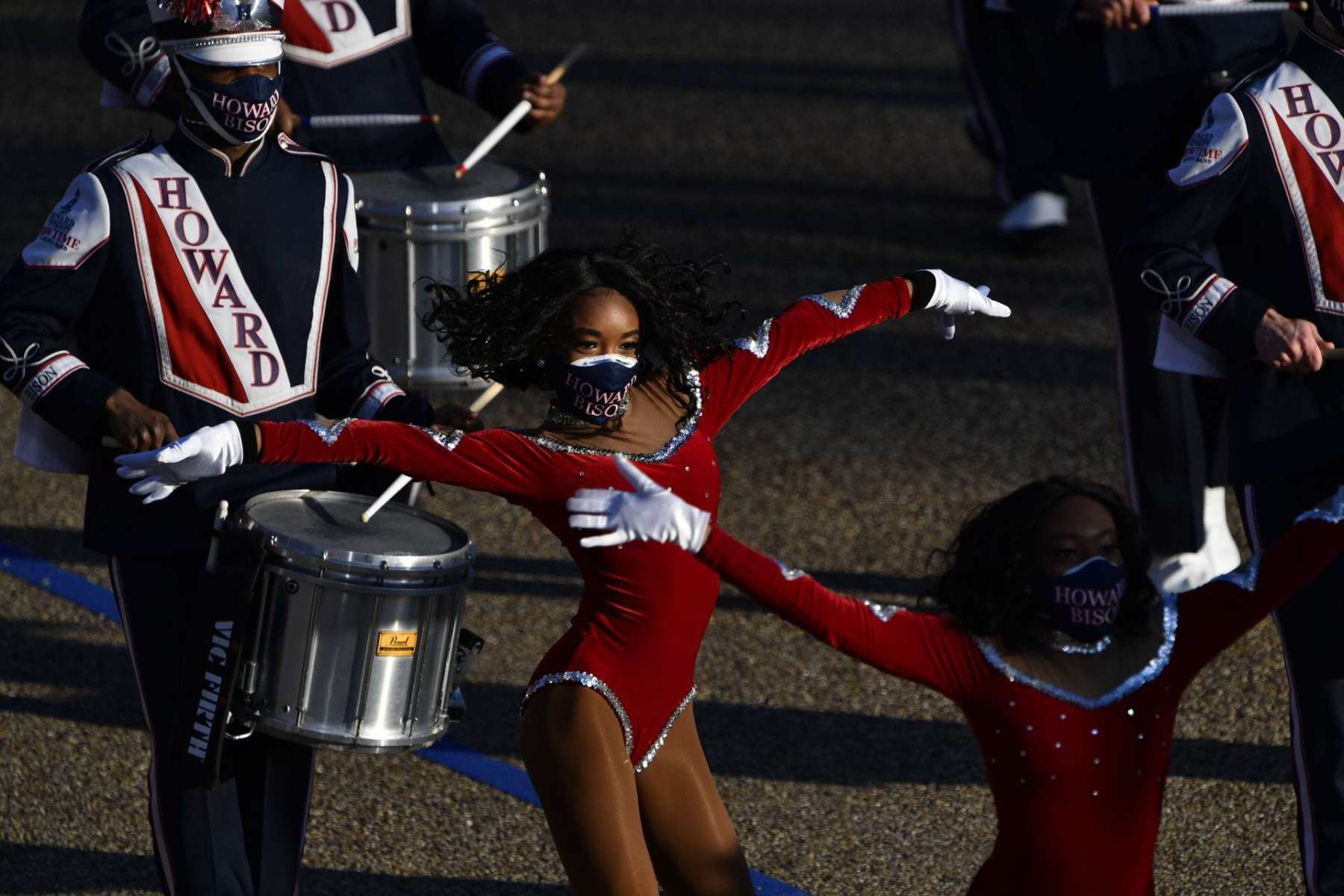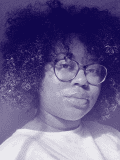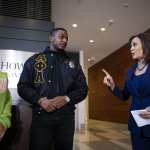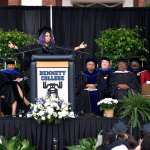When Kamala Harris announced her presidential bid, she chose to do it at her alma mater, Howard University. On Wednesday, the university marked Harris’ ascendance to the vice presidency with 49 bell tolls, one for each vice president, followed by the Black national anthem. Hours after Harris was sworn in as the first woman vice president, members of Howard’s Showtime Marching Band escorted her during the inaugural parade.
Destiny Moore, 23, is Showtime’s drum major, the fourth woman to hold that role. When Moore arrived at Howard, one of the drum majors was a woman, instilling in Moore a mindset that she could one day hold the same position. At every step along her journey at Howard, Moore said she’s been surrounded by Black women in leadership positions on campus and in internships she’s held. So for a Howard alumna like Harris to become the first woman in the White House? It wasn’t surprising to Moore.
“With Kamala Harris getting more widespread recognition, I hope this is a common occurrence, something we are getting used to, that is expected, that is not a surprise every time,” Moore said.
The Showtime band escorting Harris brought the vice president’s political ascent full circle. Throughout, the Howard grad and proud member of Alpha Kappa Alpha Sorority, Inc., has centered Historically Black Colleges and Universities, or HBCUs. And the impacts, generations of women students and graduates of HBCUs believe, are myriad.
Despite the enduring legacies of HBCUs, many students find themselves defending their institutions against the idea that Black colleges don’t reflect the real world or prepare students to face circumstances beyond these bulwarks of Blackness.
Gwendolyn Mackel Rice, a 1961 graduate of Bennett College, one of two HBCUs for women in the country, recalls a time, before colleges and universities fully integrated, when “everyone knew about Bennett College” and all of the other HBCUs. More recently, she’s had to do more to explain her alma mater. But with Harris in office, Rice feels her presence, as well as Stacey Abrams’ — an alumna of Spelman, the other Black women’s college — will usher “an unprecedented level of validation” for the institutions. It’s a sentiment Rice, who turned 80 Thursday, hasn’t felt in a long time.
It could also offer increased federal support. In recent years, due to financial challenges, many HBCUs have shuttered their doors. Bennett recently wrapped a two-year battle for its accreditation, which threatened its eligibility for federal funding such as Pell Grants and work-study programs. While campaigning, Biden and Harris promised to make HBCU funding a priority. Nearly three in five students at HBCUs are low-income, first-generation students, and approximately 78 percent of HBCU graduates have taken on student loans.
As Harris was sworn in, Linda Brown, Rice’s classmate, couldn’t stop thinking about her Bennett College sisters.
Both Rice and Brown participated in the Woolworth sit-ins in Greensboro, North Carolina, to integrate public spaces like lunch counters and dismantle Jim Crow laws. Brown authored “Belles of Liberty: Gender, Bennett College, and the Civil Rights Movement in Greensboro, North Carolina,” in 2013 because she was “tired of the boys getting all the credit.” But Brown also wanted to tell the legacy of “principled activism” on Bennett’s campus, one that she said comes with an HBCU education — no matter the school.
“We were educated to aspire to the best we could give, we were educated to serve and to excellence — [Harris] is a symbol of all that,” Brown said. “Whether you went to Spelman or Bennett or Howard or Hampton or wherever you went, I think that message of giving back was part of our education.”
HBCUs have been judged by their resources rather than what they’ve produced, Rice said. But the concept of having to do more with less gets deeply ingrained in matriculants, teaching them how to navigate various racial, social and economic settings.
“We know how to do with, and we know how to do without,” Rice said. “That gives us a deeper capacity to serve. We know the value of chitlins as well as the value of prime rib. We know how to make something out of nothing.”
Nira Headen, 21, a senior at Howard University, and member Delta Sigma Theta Sorority, Inc., hopes people realize that Harris is not an anomaly. Headen rattled off other notable HBCU alumni who made the Biden-Harris administration, and a scant Democratic Senate majority, possible: Senator-elect Raphael Warnock of Georgia, who graduated from Morehouse College; Abrams, whose decade of work to turn Georgia blue paid off; and Keisha Lance Bottoms, mayor of Atlanta, who was considered for a Cabinet position and graduated from Florida Agricultural and Mechanical University.
“No longer can somebody, a college counselor or another student, tell anybody interested in HBCU that they don’t prepare you for the real world,” Headen said. “So I firmly believe that Vice President Harris, in addition to the conglomerate of Black excellence that has come from HBCUs, have completely thrown that theory — that’s always been false — out the window.”
We know the value of chitlins as well as the value of prime rib. We know how to make something out of nothing.”
Gwendolyn Mackel Rice, 80
Many have attributed Harris’ questioning style during Senate hearings and her poise in public to her time as a prosecutor. Howard students and alumni tell you it comes from her matriculation through “The Mecca,” a nickname for their institution. For Moore, that realization came during Harris’ debate with former Vice President Mike Pence, when she asserted in two words what would become a rallying cry for interrupted women everywhere: “I’m speaking.”
“As women, especially Black women, it’s easy for people to talk over us, to not be heard, for people to not let our thoughts be complete before they want to retaliate with their own arguments,” Moore said. “You need to stand up for yourself, and that’s something you learn at Howard, is how to stand up for yourself, not to get crazy, yelling, but you can make your voice heard and still look great.”
For Headen, who is also president of Howard’s National Pan-Hellenic Council, an umbrella organization over the nine African-American sororities and fraternities, it was demonstrated in the way Harris executed her line of questioning while serving on the Senate Judiciary committee, particularly around the hearings for former President Donald Trump’s impeachment trial. She recognized Harris’ way with words as “Howard training.”
Headen’s parents met at Howard, and if it weren’t for the pandemic, the family would have traveled from Baltimore to Washington, D.C., for the inauguration, as they had for both of President Barack Obama’s. Headen wished it had been safe to witness the Howard band and dancers flank Harris during the parade, but the January 6 insurrection at the Capitol made that impossible. But she knows this won’t be the last time to witness “Black excellence.” So she made plans on Wednesday to pour a hot cup of coffee, put on her T-shirt with the phrase “Comma-la” on it — emphasizing the pronunciation of the vice president’s name, which is often intentionally bungled — and watch the day’s events on her laptop.
“I know for a lot of people, what’s recognized about Black people are the first, the first, the first,” Headen said. “This isn’t the first nor the last time that we’re going to be able to celebrate something like this. And so I want to make sure I’m alive for all of the second, third, fourth, fifth etcetera.”
Various HBCU students and professors who are connected to Harris through Alpha Kappa Alpha, the first African-American sorority founded at Howard in 1908, watched as Harris became another first.
Just last week, Santiba Campbell, an HBCU graduate and associate professor of psychology at Bennett, donned her “Kamala Harris for the Culture” T-shirt, the letters etched in her sorority’s colors, pink and green. It was her Founders’ Day look for her various Zoom meetings that took place on the day her sorority turned 113 years old. Campbell received her doctorate from the University of Delaware, Biden’s alma mater. She’s “full of optimism” as the Biden-Harris administration takes the helm.
“I have never shared this many identities with the president and vice president of the United States of America,” Campbell said in an email. “Based on our alma maters, class, race and gender, this duo feels like people you already know. I trust their diverse backgrounds will inspire ideas and initiatives with entities in our society that were previously overlooked.”
Ashley Robinson, a senior at Bennett and another member of Alpha Kappa Alpha Sorority, Inc. feels motivated with Harris in office.
“I have always felt embraced by the Bennett community. However, as an African American woman about to graduate from an all women’s HBCU, I know that may not always be the case,” Robinson said via email. “Her victory fuels my fire not only as a long-term leader but someone who has an interest in policy and politics.”
It was the intentionality of the day that resonated with Dana Williams, a professor of African American literature at Howard and a member of Alpha Kappa Alpha Sorority, Inc. From the purple Harris wore as a nod to Shirley Chisolm’s campaign, to the oath of office Harris took with her left hand upon the bible of first Black Supreme Court Justice Thurgood Marshall, an alumnus of Howard Law School. One of Harris’ first tasks as vice president was swearing in Warnock, an alumni of a men’s HBCU.
While Williams is giving herself the space to be excited for just a moment, she’s also thinking about any pushback to what’s shaping up to be the most diverse Cabinet in history, ushered in by a woman who is many firsts, but hopes not to be the last.
“If the backlash from Barack Obama’s presidency was Donald Trump’s presidency, and then the backlash from Trump’s loss was the invasion of the Capitol, what does the backlash to the most diverse Cabinet that we’ve seen in American history, and the first Black woman and person of Asian and Caribbean descent, look like?” Williams said. “And how are we prepared to deal with it?”
Correction: An earlier version of this article misstated Nira Headen’s leadership roles.






